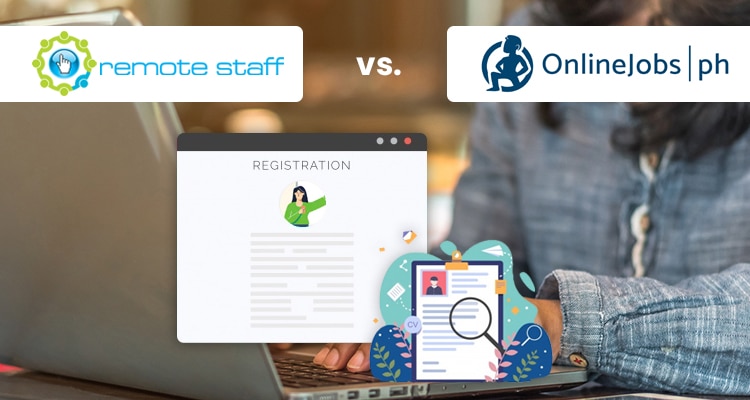So, the other day, we talked about why it’s better for clients to get remote workers on a remote work agency rather than on the freelancing marketplace.
Well, I’m here to tell you how the same can be true for remote workers too. I’m talking about getting work on a remote work agency vs. on a freelancing marketplace.
But before I do that, here’s a little disclaimer. Everything I will talk about from here on out is solely based on my personal experiences. I’m sure there will be several WFH gurus out there who will disagree with me, and that’s fine. We all have our own tips and tricks for making it in this industry, and so long as they’re all legal and ethical, you’re free to go your own way.
Oh, and the usual “my opinions do not necessarily reflect those of my employer’s” and so on. Whatever, you know the drill.
Now, let’s move on to the matter at hand.
The Registration Process: Remote Staff vs. OnlineJobs

Sometime in December, a longtime client had to close shop. Thus, I was forced to look for remote working gigs. Immediately.
First, I tried Facebook groups. Sure, there were loads of opportunities, but competition was fierce. And to be honest, some of the job postings sounded like scams. A few job descriptions also sounded like slave labor. USD5 for every 1,000-word article? No thank you!!!!
Second, I signed up on OnlineJobs. (I didn’t bother with Upwork because I’m not keen on their 20% commission rates. NOPE.) The registration process wasn’t too shabby. I filled out a form, uploaded scans of my government-issued ID’s, and took some exams. There was an IQ test, an English proficiency test, and even a dominant personality test. Completely understandable.
It took me about a day to complete my OnlineJobs profile, and I looked at all the listings for content writer openings afterwards. There were pages upon pages of them, and quite a few did catch my eye. I also eventually managed to book a part-time gig in mid-January through the platform.
Lastly, I was fortunate enough to get a call from my longtime client for a new project about a month later. She had me sign up on Remote Staff, which was handling her remote workers, and I did so, happily. The registration process wasn’t too different from Online Jobs. I filled up a form, uploaded ID scans, etc. The only difference was that I had to upload a voice recording too. It wasn’t too hard.
About a month later, I resigned from my client on OnlineJobs and stuck with Remote Staff. I’ll explain why in the next section.
Getting a Job and Getting Paid: My Remote Staff Experience

Before you jump to any conclusions, there was nothing wrong with my OnlineJobs client. I won’t reveal what his company does for confidentiality purposes, but he was a decent boss. He took the time to train me, gave proper feedback, and (mostly) paid on time.
I just liked working with Remote Staff better. And I’m not just saying that because I work here now.
First, I got a long-term gig a lot faster on Remote Staff. When my stint on my previous client’s project ended, I got absorbed into Remote Staff’s marketing team. Apparently, the company really exerts all efforts to get you rehired as soon as possible should you find yourself without a job all of a sudden.
In contrast, I applied to over a dozen jobs on OnlineJobs. I only got three replies out of them, and landed just one client afterwards. (Mind you, this is still incredibly fortunate.)
Secondly, I work with an amazing team on Remote Staff. They’re some of the most talented and generous souls I’ve ever met, and this makes the more hectic work days a lot bearable. Heck, I might even call working with them fun. (I bet our SEO specialist is rolling his eyes while he reads this. Yes, this includes you, dude.)
Lastly, there was a slight issue with the pay I got on OnlineJobs. Sure, I got paid regularly, but the rate they gave me in the end was significantly less than what was advertised on the job opening. Because I sorely needed a job at the time, I went with it.
Then, there was the delay in getting my last paycheck. The client said that he was having trouble with Transferwise, so I gave him the benefit of the doubt. He did pay up a month later, but it was rather inconvenient.
With Remote Staff, however, I got paid exactly what was agreed upon. Also, my salary arrives on the dot about 98% of the time.
In Conclusion

To be clear, I’m not telling you to sign up exclusively with a remote work agency.
I understand that we remote workers have to play a numbers game, and that I was relatively lucky. In order to keep working (and earning), we all need to put ourselves out there. Also, safety nets are a must in this industry. So, it’s perfectly fine to have profiles on all the remote working websites that you can.
However, there’s really something to be said about the extra security and personalized service that a remote work agency provides. So, why not try signing up with Remote Staff WHILE maintaining a profile on other freelancing platforms and groups? RS doesn’t charge registration fees, after all, so it will literally cost you nothing.
Besides, such a move could pay off for you just as much as it did for me and quite a few others.
So, what do you say? You up for it? Go on and sign up here then.
See you on the other side, friend.

